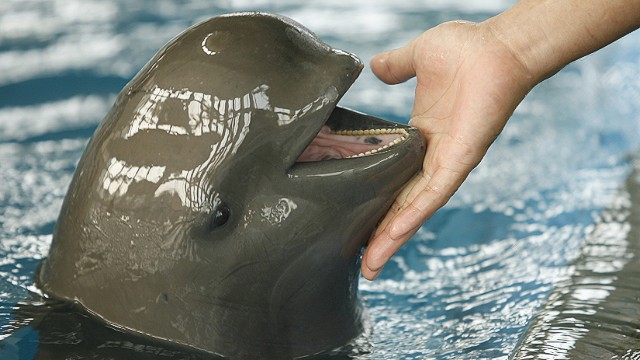STORY HIGHLIGHTS
- Researchers in China are working to protect the finless porpoise from extinction
- They're stouter than their dolphin cousins and rarer than China's giant panda
- Surveys show there are around one thousand of the animals left in Chinese waters
- Pollution, overfishing, and intensive development on the Yangtze are being blamed
Wuhan, China (CNN) -- Professor Kou Zhangbing conducts a health check. He tenderly calls the patient over with a tap of his hand, checks tongue and teeth for injuries, eyes for mood, and skin for scratches. As a treat, he hands out a salted fish.
"The most important thing we can do is to keep them healthy," he says.
Kou is one of a handful of Chinese scientists trying to save the finless porpoise, a freshwater species found in the Yangtze River. Rarer than China's giant panda, this famed species now teeters on the brink of extinction.
Recent surveys suggest that there are a mere thousand animals left, down dramatically from similar surveys conducted just six years ago.



"If proper measures aren't taken they will be extinct in 10 years, but to be honest, we only have five years to take action," said Zhang Xinqiao of the World Wildlife Fund.
Professor Kou and his colleagues research the rare mammal in a series of deep blue pools at the Institute for Hydrobiology in Wuhan. They are trying to understand these curious creatures and possibly breed them for the wild.
"I spend more time with them than with my family," said Kou, "They have become an indispensable part of my life."
It's mating season, so they dance underwater and act a little strange. Occasionally, a porpoise swims right up to the viewing glass and all but presses its face against it. The porpoise's face is set in a permanent quizzical smile. Dark and forward-facing eyes carefully monitor the movements of its visitors.
Porpoises are smaller and stouter than their dolphin cousins; they have shorter beaks, and live in smaller groups.
Those groups could be getting even smaller in the wild. Asia's longest river is also one of its most polluted. Scientists estimate that about 800 million tons of wastewater is dumped into the Yangtze every year. Pollution, overfishing, and intensive development on the Yangtze have all combined to push the porpoise near extinction.
"All of these human activities have destroyed the natural habitat of the finless porpoise, taking away their food supply and even injuring and killing them directly," said Zhang.

No comments:
Post a Comment